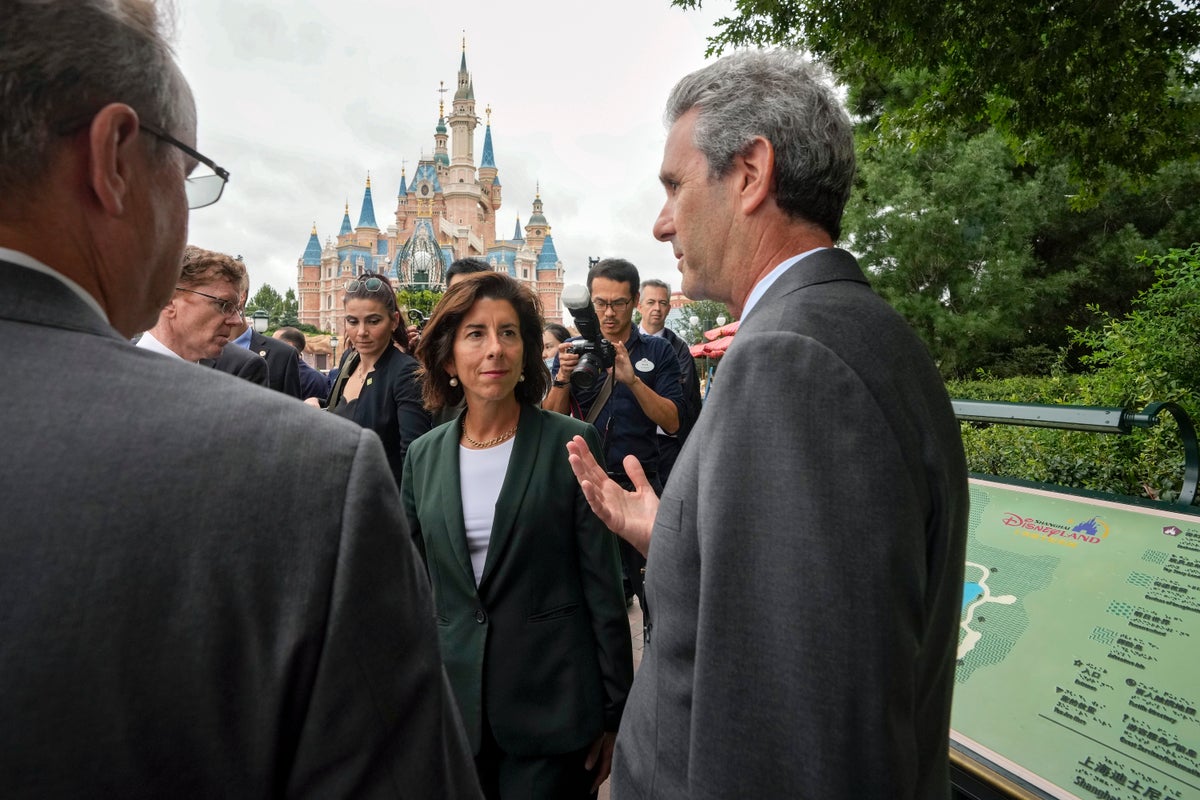
Commerce Secretary Gina Raimondo on Wednesday said she warned Chinese leaders that U.S. businesses might stop investing in their country without prompt action to address complaints about worsening conditions due to raids on firms, unexplained fines and unpredictable official behavior.
Raimondo’s comments add to pressure on Chinese leader Xi Jinping's government, which is trying to revive investor interest and reverse an economic slump. Business groups say confidence among foreign companies is at an all-time low. Official figures show foreign investment plunged in the latest quarter.
Raimondo visited Beijing as part of U.S. efforts to restore relations that plummeted to their lowest level in decades due to disputes about technology, security, Taiwan and other issues. She called her meetings with China’s No. 2 leader, Premier Li Qiang, and other officials “very productive” but said she “didn’t pull any punches” in conveying business complaints.
Raimondo said CEOs ahead of her trip told her they face increased pressure from Beijing’s expansion of an anti-spying law this year, raids on some firms, tighter controls on data and lack of information about rule changes.
“My point was U.S. business needs to see some action taken to address these issues. Otherwise, they will deem it as just too risky and, as I said, uninvestable,” Raimondo told reporters at a Boeing Co. joint venture in Shanghai’s eastern district of Pudong.
Foreign direct investment in China fell 89% from a year earlier in the three months ending in June, according to official data. Most investment is believed to be brought into the country by Chinese companies disguised as foreign money to get tax breaks and other incentives, but business groups have warned foreign companies are withholding new spending until their status is clearer.
“Patience is wearing thin,” Raimondo said. She said conditions for companies that have complained for years about technology theft and official favoritism toward Chinese competitors are “becoming in some ways even tougher.”
Economic growth slid to 0.8% compared with the previous quarter in the three months ending in June from the January-March period's 2.2%. That is equal to an annual rate of 3.2%, which would be among China's weakest in decades.
Despite that, Li, the premier, has expressed confidence the economy can hit the ruling party's annual growth target of “about 5%.”
Raimondo said she welcomed moves such as the ruling party’s announcement of a 24-point plan to improve conditions for entrepreneurs. She said the party secretary for Shanghai, Chen Jining, told her Wednesday the city was considering creating a hotline to receive business complaints.
“We have to see the situation on the ground match the rhetoric,” Raimondo said.
Raimondo’s visit produced the most substantial results of a series of trips to Beijing over the past three months by U.S. officials including Secretary of State Antony Blinken in June and Treasury Secretary Janet Yellen last month.
The two governments announced Monday they would form two groups to reduce trade tension by sharing information about U.S. export controls on technology that irritate Beijing and discuss other commercial disputes. They also agreed to have officials meet to discuss protection of trade secrets and to hold a “travel and tourism summit."
Beijing broke off dialogue with Washington over military, climate and other issues in August 2020 in retaliation for a visit to Taiwan by then-House Speaker Nancy Pelosi. The ruling party claims the self-ruled island democracy as part of its territory and objects to foreign official contacts.
Relations already were strained by a tariff war launched by then-President Donald Trump over complaints including that Beijing steals or pressures companies to hand over technology.
Li appealed to Raimondo on Tuesday for “concrete actions” by Washington to improve relations, a reference to Chinese pressure for changes in U.S. policy on Taiwan, technology and other issues.
Washington has blocked Chinese access to processor chips and other technology on security grounds. That threatens to hamper the ruling party’s ambitions to create artificial intelligence and other industries. Xi accused Washington in March of trying to block China’s development.
The group held its first meeting Tuesday. Raimondo said it would meet several more times. She said the meetings are intended to provide information and won’t result in changes to U.S. export controls.
“We were able to clarify in the first meeting that we’re not targeting China,” Raimondo said. “We’re targeting action and behavior which undermine U.S. national security, and we sought to begin clarifying our procedures.”
Export controls “will continue to be the area of the most disagreement, but communication can only help,” Raimondo said.
Conditions for foreign companies have worsened following the expansion of an anti-spying law that some say leaves them unclear about what consumer and other information they can gather. A research firm, Mintz Group, was fined $1.5 million this month on charges it improperly gathered data. China ordered makers of some data equipment to stop using products from the biggest U.S. maker of memory chips, Micron Inc., on security grounds.
The secretary said she raised the status of Visa and Mastercard as an example of the need to treat each other’s companies the same way. The credit card issuers have waited for years for approval of applications to operate in China, while Chinese payment services Alipay and UnionPay operate freely in the United States.
“We did not resolve anything, but I thought that it was important to put the issue on the table,” Raimondo said. “And I did feel heard.”
In a phone call later with reporters, Raimondo said she mentioned to Chinese officials that her own emails were stolen by computer hackers. She said nothing about the source, but The Washington Post reported in July that she and Blinken were targets of state-backed Chinese hackers.
“I mentioned that as an action that erodes trust," she said.







